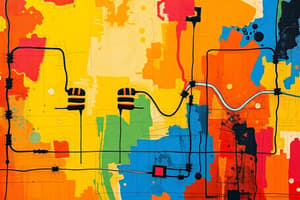Podcast
Questions and Answers
What type of electric potential does AC voltage represent?
What type of electric potential does AC voltage represent?
- Unidirectional and stable
- Intermittent and random
- Continuous and changing (correct)
- Discontinuous and constant
How do AC generators produce AC voltage?
How do AC generators produce AC voltage?
- By using chemical reactions
- By storing static electricity
- By converting mechanical energy into electrical energy (correct)
- By directly connecting to solar panels
What is the purpose of AC circuits?
What is the purpose of AC circuits?
- To convert AC to DC voltage
- To generate mechanical energy
- To distribute power through wires (correct)
- To store electrical energy in batteries
What is the role of transformers in AC power systems?
What is the role of transformers in AC power systems?
What is the formula for calculating AC power?
What is the formula for calculating AC power?
What does apparent power (VA) represent in AC power?
What does apparent power (VA) represent in AC power?
Why is AC voltage preferred for long-distance transmission?
Why is AC voltage preferred for long-distance transmission?
What is the main purpose of transformers in an electrical system?
What is the main purpose of transformers in an electrical system?
Which type of power can be expressed as the product of voltage and current in an AC system?
Which type of power can be expressed as the product of voltage and current in an AC system?
What is the role of power factor (PF) in an AC system?
What is the role of power factor (PF) in an AC system?
Flashcards are hidden until you start studying
Study Notes
Alternative Current: The Power of AC
Alternating Current (AC) is the lifeblood of modern electricity, powering everything from our homes and factories to digital devices and cities. Let's uncover the essentials of AC voltage, AC generators, AC circuits, and AC power, including the transforming magic of transformers.
AC Voltage: The Sine Wave
AC voltage is a continuous, changing electric potential that alternates between positive and negative values, typically following a sine wave, as displayed in Figure 1.

Figure 1: A Typical AC Voltage Sine Wave
AC Generators: The Source of Power
AC generators, or alternators, produce AC voltage by converting mechanical energy into electrical energy. They typically use a rotating magnetic field to generate voltage in a set of coils arranged within a stator, as illustrated in Figure 2.

Figure 2: AC Generator Schematic
AC Circuits: The Distribution of Power
AC circuits distribute power by routing the electrical current through wires, allowing for the transmission of electrical energy to homes, businesses, and other locations. AC voltage is preferred for its ease of long-distance transmission and the possibility of using step-up and step-down transformers.
AC Power: The Basics
AC power is measured in watts (W), which is the product of voltage (V) and current (I). The power factor (PF) is an important factor in understanding how efficiently AC power is utilized in a system.
[ P = V \times I ]
AC power can be expressed in either the real power (W) or apparent power (VA). Real power is the actual power being used, while apparent power (VA) is the product of voltage and current, which may include reactive power (VAR) when the current is not in-phase with the voltage (as in inductive or capacitive circuits).
[ VA = V \times I = \sqrt{P^2 + VAR^2} ]
Transformers: The Converters of Power
Transformers are electromagnetic devices that can change the voltage of AC power through a process called mutual induction. They are essential in the distribution network, allowing for the voltage levels to be stepped up, transmitted over long distances, and then stepped down to reach their intended destinations.
Transformers can also be used to isolate electrical circuits and block unwanted currents.
Transformers come in a variety of sizes and configurations, as shown in Figure 3.

Figure 3: Common Types of Transformers
With a solid understanding of AC voltage, AC generators, AC circuits, AC power, and the transforming magic of transformers, we now know the vital components that make up the alternative current system powering our world.
Studying That Suits You
Use AI to generate personalized quizzes and flashcards to suit your learning preferences.




